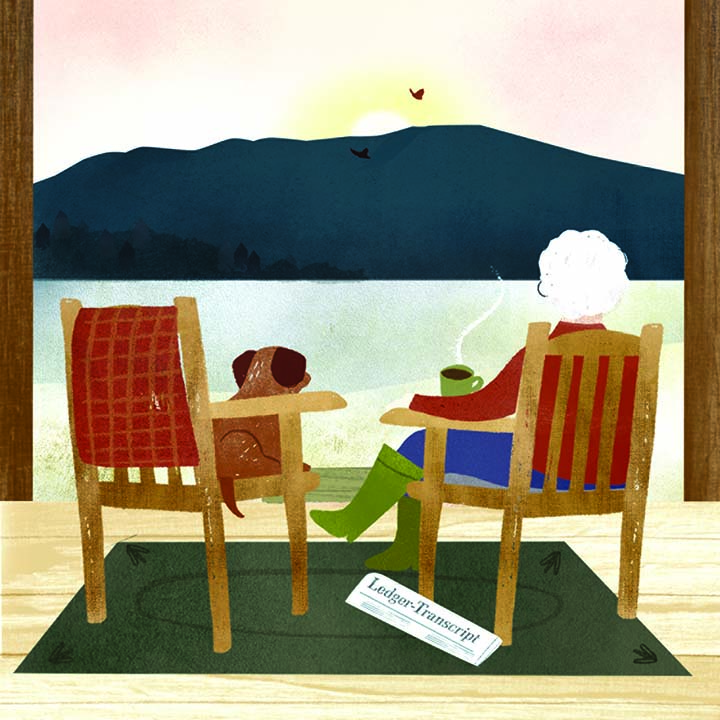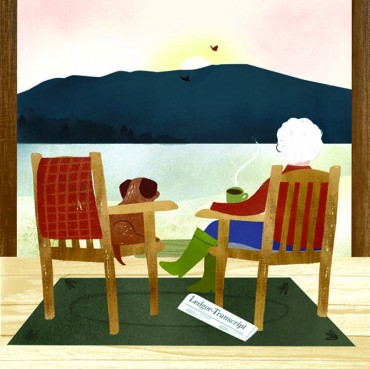Magazine
As Simple As That | Mary’s Farm
In a lifetime of change, a cast-iron cookstove and a porch with a view remain constants. Many years ago, my husband Michael and I moved up here from the city. We built a little house, paying cash as we went and doing all the work ourselves, including building the four-flue center chimney. This was in […]

Photo Credit : Clare Owen/i2iart
 In a lifetime of change, a cast-iron cookstove and a porch with a view remain constants.
Many years ago, my husband Michael and I moved up here from the city. We built a little house, paying cash as we went and doing all the work ourselves, including building the four-flue center chimney. This was in the early 1970s. While the rest of America was going forward, we were going backward, chopping wood, carrying water, leaving behind the frantic pace of the city and finding peace in the bosky woods of New Hampshire.
We bought a beautiful cast-iron wood-fired cookstove, smooth as polished stone, with nickel trim hinting at its worth. After much trial and error, I learned to cook on that stove, and I still cook on it today, three houses later, and with a great deal more finesse than in those days. It’s hard to believe that 40 years have gone by and that in that time I’ve experienced divorce, the death of my second husband, Paul, and the rebirth of the farmstead where I currently live. Through it all, the stove has come with me, and I find that as time passes, fewer and fewer people understand or even trust what this stove can do. It makes me wonder: Have I held on too long to this anachronism? Have I myself become an anachronism?
We came up here with the idea of simplifying our lives. For a number of years, this dream came blissfully true. The place we chose was our Paris, where we could live cheaply, allowing time to pursue our dreams; for me, that was to become a writer. But then it began to unravel. I suppose that this is life, and who alive hasn’t experienced the extinction of a dream, the disappointment of a broken promise? Change is a constant. We make adjustments; we move on.
After Paul died, I made the conscious decision to continue on alone. Many friends urged me to move back to the city and be among people, meet someone new. I wanted to stay where there are no houses within sight of my own; I wanted to be able to hear the birds at first light and see the stars glow through dark skies. What I have in this place could never be duplicated. Storms are fiercer up here and sometimes peel the shingles right off my roof, but the closing in of winter and the opening of spring remain thrilling to me, no matter how much time passes.
Television reception on my hill is spotty and cable service unavailable. I read newspapers and magazines to stay in touch. Everyone seems to have a GPS and a smartphone. Though these devices seem to have been invented to simplify our lives, they seem to me to be complications in a world that I already sometimes find bewildering. I’m left wondering: What is simple? What really simplifies our lives?
In winter, my porch serves as a woodshed, handy to the woodboxes in the kitchen and living room. In the spring, I move whatever is left of the woodpile back into the shed, sweep away the wood chips, roll out the old rug, put the screens back in, and carry the porch furniture up from the horse barn. At dawn on a clear May morning, I settle into one of the old familiar summer chairs and sip my tea, listening to the joyful notes of the bobolinks building their nests in the fields all around me.
Unless the power has gone out, I don’t carry water anymore, but I still chop wood. My lovely black beauty still provides the ease of a spreading warmth on an early-summer morning. There’s a continuity in that. I guess it is just as simple as that.
In a lifetime of change, a cast-iron cookstove and a porch with a view remain constants.
Many years ago, my husband Michael and I moved up here from the city. We built a little house, paying cash as we went and doing all the work ourselves, including building the four-flue center chimney. This was in the early 1970s. While the rest of America was going forward, we were going backward, chopping wood, carrying water, leaving behind the frantic pace of the city and finding peace in the bosky woods of New Hampshire.
We bought a beautiful cast-iron wood-fired cookstove, smooth as polished stone, with nickel trim hinting at its worth. After much trial and error, I learned to cook on that stove, and I still cook on it today, three houses later, and with a great deal more finesse than in those days. It’s hard to believe that 40 years have gone by and that in that time I’ve experienced divorce, the death of my second husband, Paul, and the rebirth of the farmstead where I currently live. Through it all, the stove has come with me, and I find that as time passes, fewer and fewer people understand or even trust what this stove can do. It makes me wonder: Have I held on too long to this anachronism? Have I myself become an anachronism?
We came up here with the idea of simplifying our lives. For a number of years, this dream came blissfully true. The place we chose was our Paris, where we could live cheaply, allowing time to pursue our dreams; for me, that was to become a writer. But then it began to unravel. I suppose that this is life, and who alive hasn’t experienced the extinction of a dream, the disappointment of a broken promise? Change is a constant. We make adjustments; we move on.
After Paul died, I made the conscious decision to continue on alone. Many friends urged me to move back to the city and be among people, meet someone new. I wanted to stay where there are no houses within sight of my own; I wanted to be able to hear the birds at first light and see the stars glow through dark skies. What I have in this place could never be duplicated. Storms are fiercer up here and sometimes peel the shingles right off my roof, but the closing in of winter and the opening of spring remain thrilling to me, no matter how much time passes.
Television reception on my hill is spotty and cable service unavailable. I read newspapers and magazines to stay in touch. Everyone seems to have a GPS and a smartphone. Though these devices seem to have been invented to simplify our lives, they seem to me to be complications in a world that I already sometimes find bewildering. I’m left wondering: What is simple? What really simplifies our lives?
In winter, my porch serves as a woodshed, handy to the woodboxes in the kitchen and living room. In the spring, I move whatever is left of the woodpile back into the shed, sweep away the wood chips, roll out the old rug, put the screens back in, and carry the porch furniture up from the horse barn. At dawn on a clear May morning, I settle into one of the old familiar summer chairs and sip my tea, listening to the joyful notes of the bobolinks building their nests in the fields all around me.
Unless the power has gone out, I don’t carry water anymore, but I still chop wood. My lovely black beauty still provides the ease of a spreading warmth on an early-summer morning. There’s a continuity in that. I guess it is just as simple as that.

